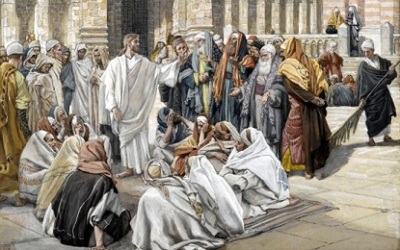 “This is evidence of the just judgment of God, so that you may be considered worthy of the Kingdom of God, for which you are suffering. We always pray for you, that our God may make you worthy of his calling and powerfully bring to fulfillment every good purpose and every effort of faith, that the name of our Lord Jesus may be glorified in you, and you in him, in accord with the grace of our God and Lord Jesus Christ.”
“This is evidence of the just judgment of God, so that you may be considered worthy of the Kingdom of God, for which you are suffering. We always pray for you, that our God may make you worthy of his calling and powerfully bring to fulfillment every good purpose and every effort of faith, that the name of our Lord Jesus may be glorified in you, and you in him, in accord with the grace of our God and Lord Jesus Christ.”
Saint Paul wrote these words in about 50 A.D., but they apply just as well to us today. We need to pray for the leaders of our church. Our priests and bishops need our prayers right now more than ever. Satan sometimes assaults our clergy on a regular basis. The more holy the priest, the more severe the assaults of the devil. We don’t want to lose anyone on our journey to heaven, but most especially those who have given their lives for the love of Jesus Christ, and his people. It doesn’t matter how well we start out, but how we end the race that matters, and that applies to our clergy as well.
People are not nearly as strong alone, as they are in a group though. Have you ever gone through a period of suffering, grief, isolation, depression, or had family problems, and felt your faith falter? But, you made yourself go to Mass, and as the Mass progressed, it helped to just sit with the other members of the parish, and say the Creed together and sing the hymns. Just being with your faith community helped you to feel like you were not so alone in your struggles. It is an extra boost to your spirits to be with people who accept you, are happy to see you, and shake your hand or give you a hug after Mass.
Our faith communities can be such a healing environment, kind of like a hospital is when you are sick or injured. We may be weak individually sometimes, but if we are fortunate enough to belong to a holy, faith filled parish community, it can really help to support us, and encourage us to grow in holiness too. The same can be said of our priests. They shouldn’t be kept on the outside looking in, but be genuinely included in our lives, as extended family. This is hard to do for women sometimes, for obvious reasons, but the men in our parishes could reach out to the priests more, by inviting them to dinner or another activity they might enjoy. Being included, and treated as a genuine part of the faith community is good for everyone, including our clergy.
The Pharisees and scribes in today’s gospel are sick, spiritually, but at least their deeds were out in the open and Christ was able to confront them about it. Passive aggressive, or secretive behavior is much more difficult to confront, because no one will admit that they’ve done anything wrong. It is much better to get things out in the open, confront the situation, try to resolve it, and then work toward forgiveness, of any hard feelings that may have happened as a result of the confrontation.
Jesus sure didn’t make a lot of friends among the Pharisees and scribes in today’s gospel, though. He told them like it was, in no uncertain terms. You can’t help but admire his courage. Could we have stood up and confronted the spiritual leaders of our own time, if we knew they were seriously in the wrong? Jesus knew he would suffer the consequences for confronting the Pharisees, but he did it anyway.
Why did Jesus do it? Why did Jesus intentionally provoke the Pharisees and scribes, knowing that a lot of hard feelings would erupt afterwards? The first sentence of the gospel gives us a clue. “Jesus said to the crowds and to his disciples: Woe to you, scribes and Pharisees, you hypocrites. You lock the Kingdom of heaven before men. You do not enter yourselves, nor do you allow entrance to those trying to enter.”
The reason Jesus confronted the scribes and Pharisees, was to stand up for the people they were supposed to have served. Jesus spoke up for the way the scribes and Pharisees had neglected to lead their people, and who had instead, made life much more difficult for them. The Pharisees ‘locked the doors’ to the people’s right to kindness, forgiveness, peace, well being, and a loving relationship with God, their Father and with one another.
How often do we think of the common good? Or do we mostly think about our own lives, and are concerned with our own lifestyle?
That’s a good thought for today. Jesus was always concerned for the common good, but the Pharisees were only concerned about themselves, their position in the religious community, and their own lifestyle.
Hopefully, we are already on the right track though, and care about the common good of the communities in which we live, as much as we do our own families.
Daily Mass Readings:
Thessalonians 1: 1-5, 11-12 / Psalm 96 / Matthew 23: 13-22
